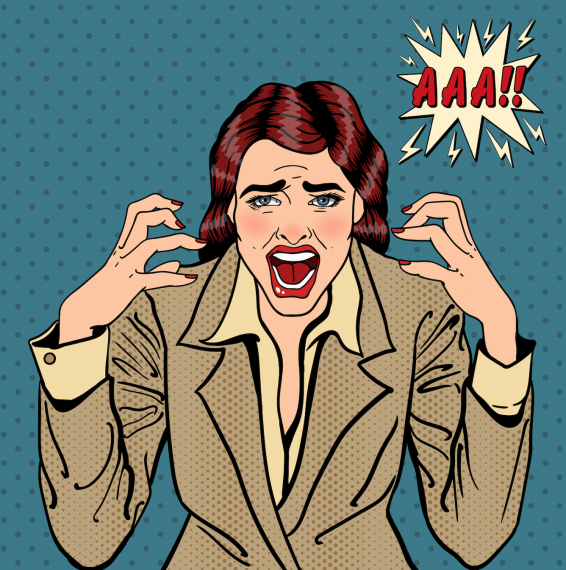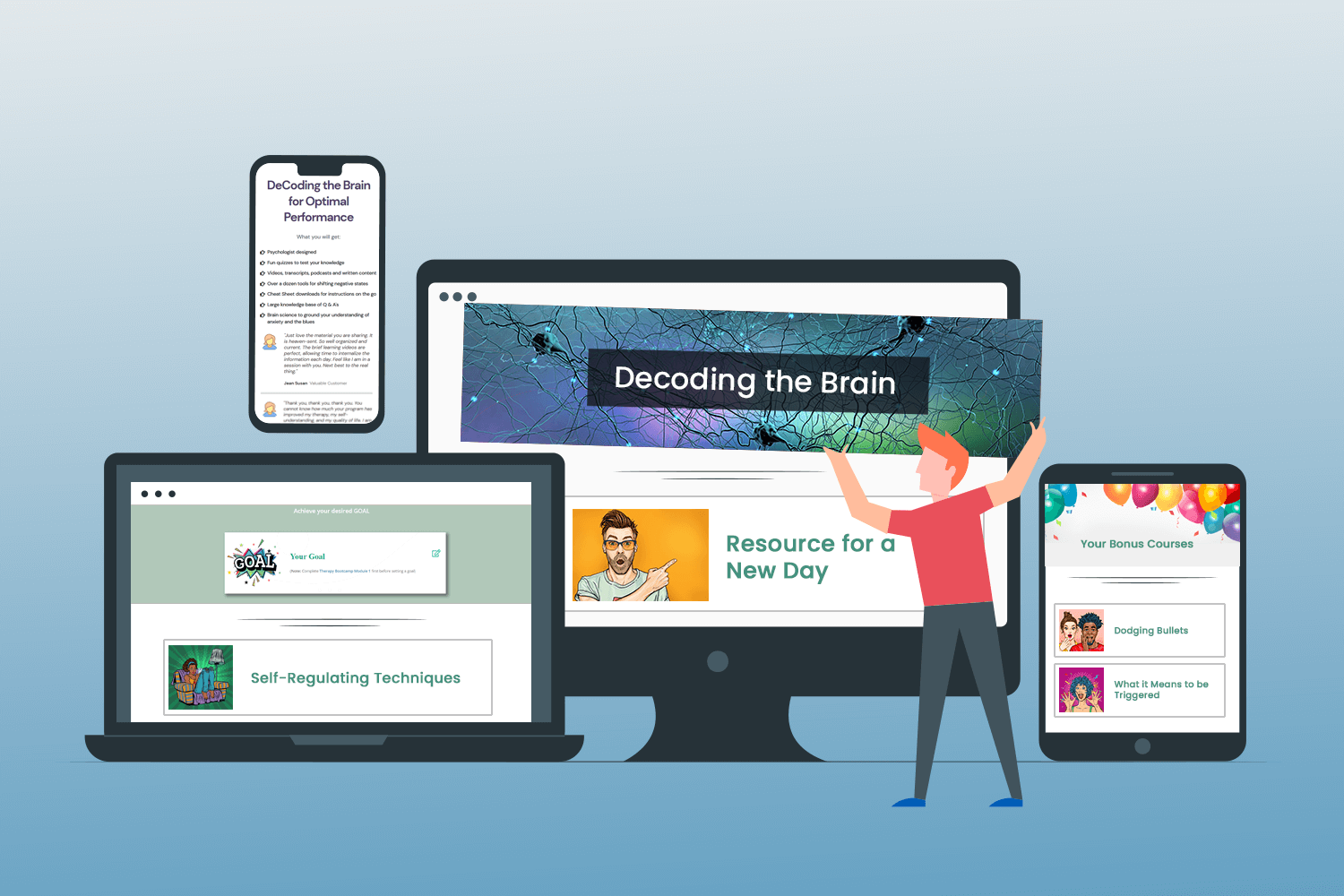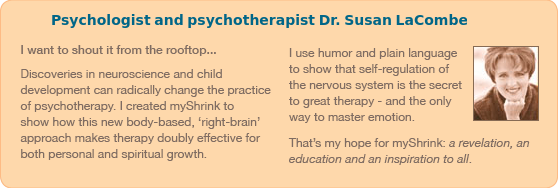How do you deal with being so easily triggered you want to pull your hair out? Simply stated, one trigger at a time.
Your initial, knee-jerk reaction is to blame it on the person in front of you.
That was me a few days ago: "I'm not going to do anymore", I yelled as I thought, "If I have to repeat it once more, I'm going to bite his head off".
"Well, I'm not going to tell you," I said adamantly like the petulant child I felt at the time.
I want to scream and blame him: "It's not my fault you can't hear!"
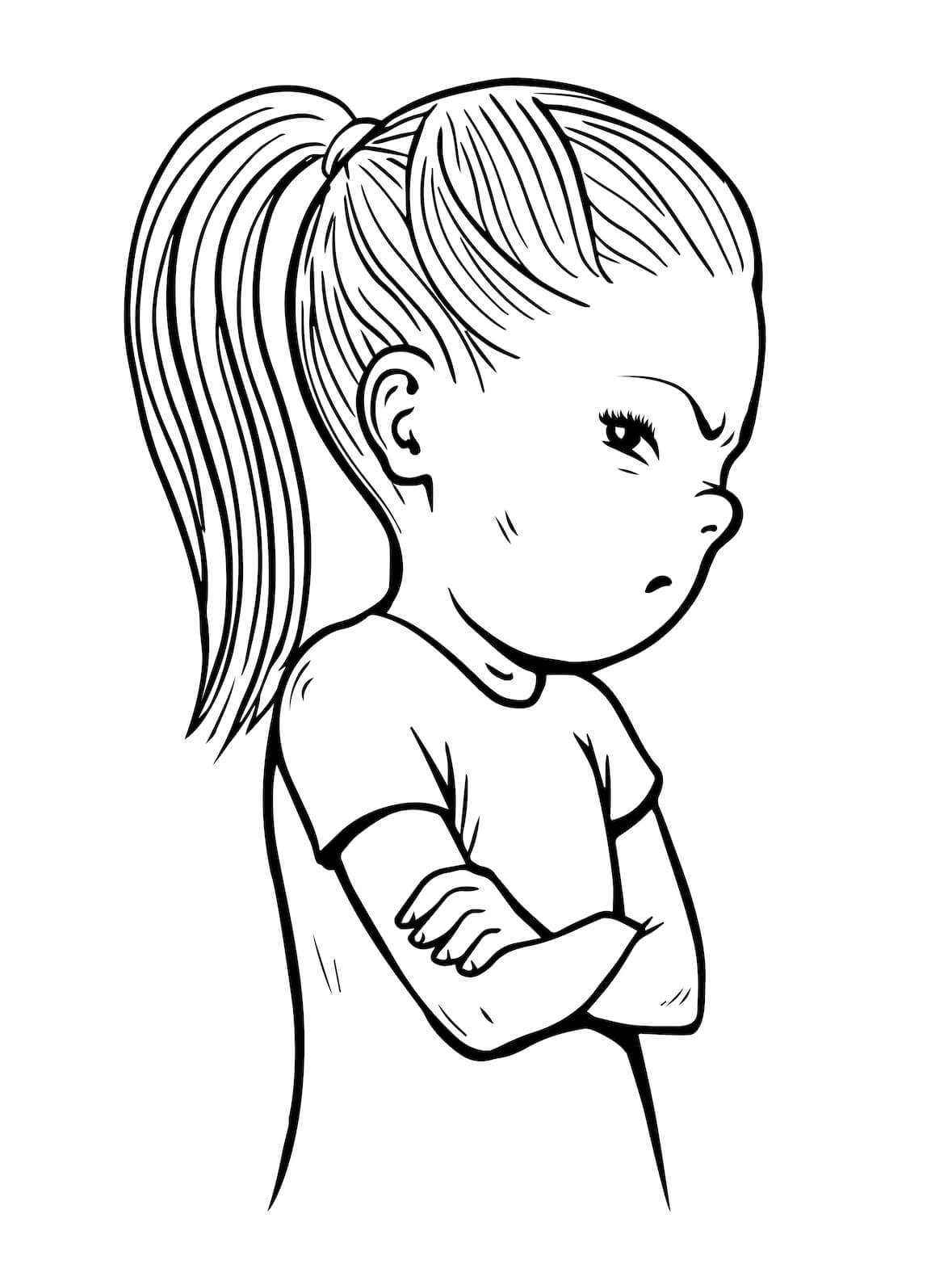
Of course, it's not his fault. My long time friend's hearing is not was it once was. And he is getting a hearing aid soon.
The reality is I am responsible for how I react.
On a relaxed day, I merely slow my speech down. I enjoy my conversations with him. On stressed days when I've got a lot going on, I'm more apt to lose it especially with each nuanced repeat.
We are of course always responsible for how we feel and react—no matter if we recognize we're being triggered or not.
Being Triggered: Thankfully, it's not your fault—it is your responsibility
It's interesting that I felt like a child in that moment. Over six decades since I was in reality that child, and here she was loud and clear attempting to force her presence into the situation.
From my own recollection and my mother's stories, I don't think I actually got to exert my wishes so forcefully back then. My mother was a very young single Mom at the time I was two so I assume - based on my later behavior - I was a compliant little girl who just wanted to help her Mom take care of my younger sister.
Children are keen observers of their environment—much more that is appreciated today—I don't think I would have felt the freedom of being able to explore and act out on my basic developmental instincts.
Indeed, it's very likely that my early experiences set me up to have expectations that were beyond my capabilities at the time. So of course, I carry this pattern into my day to day life.
Is it my friend's fault that I've jammed too much into my day or that my own expectations have suddenly got the better of me? Of course not.
I am the master of my own life. I alone make the choices and directions I take. It might not be my fault that I carry this load—it is my responsibility tho.
This is the essential issue when we're triggered: you are responsible for how you feel and react. Any behaviors you choose to take are yours alone.
Let's step back a bit . . .
The Mind-Body Connection to Being Triggered
It's helpful to recognize that we're actually triggered all the time—both positively and negatively—but we only notice when it crosses a certain threshold.
You hear a piece of music you love. Warm, tingly feelings wash over you.
Suddenly, you're transported back in time, feeling the same emotions and sensations as before.
Yes, you're being triggered—in the most positive way.

The right piece of music can take your mind away.
Of course, if you're familiar with the concept of being triggered, you likely think of it mostly in the negative.
Science tells us that when we experience a trigger, our body's charge increases and can be measured throughout. We might notice this as tension or pent-up energy, or in the case of a positive trigger, as excitement or bliss.
There's actually a lot going on beneath a trigger that could be incredibly beneficial to uncover. Understanding these underlying emotional issues can reveal important insights about yourself and your upbringing.
By doing the work to unearth and heal these triggers, you can overcome obstacles that may be holding you back in ways you never realized. Read on to learn how to overcome and deal with triggers.
What does it mean to be triggered?
Most folks don't really understand what being triggered is all about, let alone recognize when they've been triggered.
They do recognize they're behaving in a way that's not true to themselves: an event, an interaction or even a memory sets off a cascade of churned up emotions that are suddenly hijacking your moment in time. Whether you're conscious of the fact or you merely register increased tension in your body, you've been triggered.
Then there's that "moment" that seamlessly runs into yet another trigger . . .

myShrink's own Rebel Shrink, Psychologist Dr. Susan LaCombe
That describes me some time ago. I was so easily triggered I couldn't distinguish between one trigger setting me off and the next. I was that charged up on the inside.
Thankfully, with a little 'nervous system reset' from my therapist (over many sessions 🙂 I was able to arrive at a time when weeks would go by without being triggered into a negative funk.
Today, though I don't seek out these experiences, I see being triggered as a chance to do deep healing work. Because I know if it's rising to the surface, it's already impacting me negatively - and likely - in ways that I'm not seeing at present.
So yes my friend, being triggered is an opportunity.
"Yup, there's gold in them there triggers!" 😉
What is a trigger?
The traditional notion of a trigger is anything inside of us or in our environment that evokes a strong physiological and/or emotional response. It can be something we see, smell, feel, sense, and/or hear that strongly impacts us - for good or ill.
Yeah, triggers set us off. At times, so much so, we're flipping out on a rage and the other person is looking quizzically at us as if we've just declared ourselves to be an alien from outer space.
The reality is we're triggered all the time by our environment. It's just that it's so subtle we don't take notice.
Normally though, we think of being triggered in negative terms because uncomfortable reactions are the ones we notice and struggle with. However, we can just as easily trigger ourselves into a positive state. (That's what creating a list of self-soothing strategies is all about.)
For the rest of this article though, I'll be referring to negative triggers.
What does being triggered feel like?
Just so you know, triggers are relative to your personal history. What is triggering for you may not be for your friend.
For instance, if you've been in a car accident when you've been making a left hand turn, you might recognize the following as you later approach an intersection and signal left:
- Your heart rate speeds up.
- Hands grip the steering wheel.
- Eyes open wide.
- You're struggling to concentrate.
- Feeling overwhelmed.
- And, your body is tight and braced.
In a situation like this, the anxiety and alertness you experience is understandable. In fact, you may even anticipate it.
Yet, we can also be triggered and not know why. In instances such as these we're being triggered nonconsciously. And, without an obvious explanation, these triggered responses tend to be more difficult to tolerate…not to mention, disorienting and disturbing.
An example of being triggered
Triggers tend to hover under the radar, hanging out in the nonconscious mind.
Let me explain.
Let's say you're watching a movie and a scene plays wherein the female character is alone in her home and a break-in is in progress.
The next thing you notice, you're up checking on the laundry. Seemingly odd, but is it?
If you pause to reflect for a moment, it might appear rather strange, even uncharacteristic, that as this scene unfolds, you feel an urgent need to attend to your laundry.
Girl, you just got triggered! (Ain't distraction grand!)
More seriously, we tend to associate our agitation or irritability with whatever seems plausible in the moment. And, this is how nature intended it.
By the way, doing the laundry may seem a little unusual to some folks.
But think about it. Freshly dried clothes feel warm, they smell great and there's a sense of accomplishment in the folding. It's a quick, satisfying way to ground. It's a self-soothing strategy, a resource.
For other folks, popcorn fills the bill. Go figure…we are all so unique with how we manage.
Lest you think there's no light at the end of the tunnel, here's some good news. The more conscious we are, the easier it is to recognize what's triggering us. Not surprisingly, it's also a heck of a lot easier to do self-care during these moments.
…and, as you may recall, therapy is one of the fastest ways of moving towards greater consciousness.
Of course, most people don't go to therapy "to be more conscious". It's when the triggers start interfering with their lives.
Learning how to deal with triggers, first learn how triggers develop
Well actually, you learned to react that way. Triggers have at their root a negative experience - often one you don't recall - and now you're super sensitive to things that remind you of that experience (or several experiences).
Chances are this original negative experience (or experiences) was overwhelming to your nervous system.
And when our experiences are too much for us to handle at the time, we suppress them - for later processing.
Basically, the memory of the event hasn't been registered to be in the past in your brain. It's still alive within you as if it's still happening in the present like a ticker tape running in the background. That's why there's such a charge associated with a trigger.
You see, the thing that set you off today - the present day trigger - is being powered up the past event.
A few minutes, hours, days or weeks later you may "come to your senses". It might still puzzle you why you're were having a conniption - you may even be embarrassed at how you reacted. But you do see that the amount of energy you put into the interaction, didn't match the situation. You were over-reacting.
In the worse case scenario - you blame the other person for getting you riled up. You can't see through to recognize that it was your stuff, your history that caused you to react that way.
Triggers happen automatically
What's so disconcerting is that the trigger that sets you off, is so buried deep in your consciousness, it's sometimes hard to pin point the source of it.
Just know that it's only a part of you that's getting triggered - not so much the conscious intentional part of yourself. That's what makes you feel as if you're losing control.
We're triggered all day long
The concept of "being triggered" is relative, meaning our responses fall on a continuum. They fall between high and low intensity and positive and negative affect.
We may be jolted into a state of fear by the sound of squealing tires or cued into feeling calm and peaceful by viewing the beauty of a sunset.
We're actually triggered by the environment all the time, often in very mundane ways. We're cued by the smell of coffee first thing in the morning, the sound of rain hitting against the window pane and the feel of a cold chill against our skin.
Our environment speaks to us 24/7 and each experience triggers a response in us...sometimes big, sometimes not so big.
Here's what happens when being "triggered" is taken to the next level![]()
How to deal with triggers
Simply stated, you lower your level of activation associated with the trigger. The lower your activation the less likely you will be set off by anything remotely related to your original event or trauma.
However, to deal with a trigger head on takes a more precise approach. When you're emotionally maxed, you're more likely to be triggered.
It requires lowering the arousal pattern associated with the trigger. It means taking one step at a time, one day at a time, and hopefully working with a therapist who helps you untangle the fear from the trauma triggers.
Quick overview on how to deal with a trigger and eliminate it for good:
- Realize you've been triggered. Notice how these worrisome/heavy/distracting feelings are manifested in your body's sensations.
- Using body-based tools reduce the charge in your body and allow yourself to land within a safe, centered place. (Get to that "pulled together" feeling.)
- Practice re-triggering yourself with small, related experiences bringing yourself back to baseline each time.
- When you're ready to deal with the main trigger event, recreate the scene tapping into the pain of a younger inner part. Be mindful and open to any words behind the pain that might arise. Be sure not to circumvent this step by over-thinking, analyzing or fabricating what might seem logical.
- Using the messaging derived from Step 4, address the needs of your inner child with a strong resource.
Reviewed by: Coquitlam Psychologist Dr. Carole Gaato
If you want to learn more about working through your triggers, check out DeCoding the Brain, myShrink's own.

Helen
Is this what it's like to be triggered?
Father's day just passed, and I was on facebook talking to a friend. He began sharing some stuff about his dad being in the War. As it turned out, our Dads have similar stories. He began sharing a negative experience he had the night before his dad died. I was trying to listen, understand, and console. Then my friend disappeared from facebook- just like that - no warning - just gone. I began getting very anxious about him - about something happening to him. Talked to others - getting a bit upset about it.
This morning I realized that not only is this week my Dads birthday, but also the anniversary of his death. His death was not expected. When he was dying - no one could get in touch with me because I was working in an area with no cell service, so by the time I found out, he was already gone.
Could it be that the anxiety I feel for my friend was/is triggered by the events surrounding my dads death? Is this what it is like to be triggered?
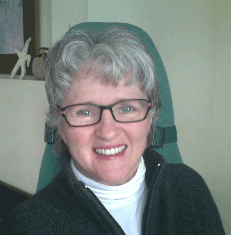
Shrinklady
Hi Helen.
I'm so sorry to hear about you're father's death and that you weren't able to be there with him at the time of his passing. And, now being aware of the anniversary of his birth and death...that's a hard one.
And yes, it could easily be the case that you were triggered by your friend's stories about his Dad as they are similar to your own. Supercharged events such as the sudden death of a loved one are not recorded by the brain like ordinary memories. That is, the body-mind can non-consciously "remember" feelings and sensations associated with negative or traumatic events - hence we are vulnerable to being "triggered" into feelings and not know where they came from.
In fact, the memory of such events is stored in a different place in the brain where there is less chance of decay (i.e. memory loss). The brain is organized this way apparently because it helps us to avoid situations in future that might be "harmful" to us i.e. those that bring up feelings of overwhelm and anxiety in the body-mind.
The problem is that we don't always know the source of what triggered us. The details of a memory related to an event might have disappeared, yet the emotional sensations are still there. We just can't access them easily. In your case Helen, I think that you are onto something...that there is a connection between your anxiety for your friend and the events around your father's death.
A bottom line is if we're feeling out of sorts and don't know why, trusting the body can help. We don't just make up distress. It arises from a real event.
Hope that clarifies things for you Helen, and thanks again for posting,
Shrinklady

Ismini (Athens, Greece)
Beautiful article, Suzanne, Very helpful and very easy to understand.

Vincent
I got over it but I still feel sad.
I get sad alot when i see death on tv and stuff see my grandpa died and i got over it but i still get sad. why do u think this is?

Shrinklady
Hello Vincent, thanks for your question. When folks say they "get over" something, they often mean they stop thinking about it. Whatever loss they experienced, just stops popping into their head.
But this is different then truly getting over a loss. If we haven't moved through our emotions related to a loss, then chances are we're not done. People can override their feelings so they mistakenly assume they're "over it".
Now, it's not to say, you haven't gotten over the death of your grandfather. It just may be possible that you had other losses in your life (e.g. loss of an attuned connection with one of your parents when you were an infant). And, it's these losses that are being triggered. They may also be adding energy to the loss of your grandfather as well.
As I mentioned, in the article on grief and counseling, the more loss we have had and the earlier that loss, the harder it will be for us to move through it.
One clue is when you watch scenes of death. If your grandfather flashes into mind, then it just may be you haven't sufficiently dealt with it yet.
I guess the next question you might have is "how do I now get over it".
Well Vincent, I can't imagine getting over anything that significant without the help of someone else. We need each other. Being around a safe friend or therapist while we experience our feelings of loss, helps us to move through the emotions, and by doing so, allows us to let them go.
I hope you have both in your life.
Hope that helps,
Shrinklady

Anne
Everything goes blurry, then goes black for a second.
When someone says something that's painful to me, or I see something that causes internal pain, everything goes blurry, then it appears that everything is going by me about 100 miles per hour then everything goes black for a moment or two, then I'm back with the pain.
Is that being triggered? How do I ground myself during that?
Thank you

Shrinklady
Well, that sounds terribly uncomfortable Anne. My first thoughts are that "going blurry" sounds like you're being flooded. And, in that case, it might be helpful to read about dissociation and see if it fits for you.
The fast movement you describe leads me to think you might be triggered into a response related to a specific trauma (like a mini re-experiencing of an event). The higher our activation, the more likely we will get tripped into a trauma response.
I'd encourage you to see a therapist and especially one that's trained in a body-based model (i.e. a body psychotherapist). For one, they could observe how you're experiencing it at the time. And for another, if we're being triggered by so many experiences, lowering our level of activation will make it less likely to be triggered in future.
BTW, I have found some trauma responses to disappear even without any identification of the specific event...thankfully, that's just the way the brain is wired.
I'm also going to run this by a colleague to see if she has anything to add. If she does, I'll post it here.
Take care,
Shrinklady

Allie
I don't understand why I still feel guilty.
i feel really sad b/c my dog got hit by a car several yrs ago and i still feel guilty but why do i still feel guilty? i don't understand

Shrinklady
Thank-you Allie for sharing this. Feelings about our pets are often strong as the love between is unconditional and for many of us this is a "longed for" experience. This safe, heart-felt connection with another life form can feel deeply profound.
So when a pet dies tragically this can lead to grief lingering even months or years later. We can also feel guilty over not being able to protect our pets from events that are outside our control.
It might be helpful to look at it this way.
As you may have read elsewhere on the site, our behaviours and feeling states are patterned in early infancy and the strength of them (i.e. how entrenched they are) shows up in our adult lives. In fact, our responses to current events may be piggybacking on earlier experiences.
For instance, while I empathize with your feelings of loss, their lingering suggests to me that your grief may be connected with other losses related to your past. So, it could be that previous losses are adding energy to your grief for your dog, making it difficult for you to let go of your pet.
It's also important to understand that guilt is a "learned" response. Somewhere along the line you may have learned to take responsibility for things that were not yours to take on.
As I have suggested, patterns like these are most likely learned in infancy.
Because the nervous system is rapidly developing early on, what is learned first is stronger then what is learned later on. Early experiences have the potential for impacting us in a greater way.
Because these patterns are set down in the right brain you've probably discovered that trying not to think about (a left brain strategy) the loss of your pet doesn't work. What can be helpful however is working with a therapist to discover the connections between past experiences and this loss to help you let go of, and yet still remember, your beloved pet.
Hope that helps to explain some of it,
Take care,
Shrinklady

Scott
Guidelines for dealing with triggers.
How can therapy help unravel the triggers? What are some practical guidelines on how to deal with triggers in the moment? Good article!

Shrinklady
Thanks for your question Scott. In short, the way I know best--and as a body psychotherapist--is to ground oneself through small doses of the fear related to the trigger.
In this way, the intensity of the fear response will start to diminish. The nervous system will, in effect, learn how to manage the charge from the trigger.
And, this point is critically important and one that a trained body psychotherapist would appreciate: If you experience too much of the fear, there's a good chance you'll get flooded. This will make it harder to move through the fear, particularly if you are on your own as you do it. It is more effective with a therapist or a caring, loving partner.
Feeling small doses of our fear response is sometimes hard but there are things you can do. For instance, if you know the trigger you can just imagine it. Fear will automatically be evoked in your body.
So, how do you ground?
You can use a resource to reduce the charge in the body. This is very individualistic of course.
So, if you're triggered by spiders (that's what get's me), then you might look at a picture of a spider and work through the sensations that emerge in your body. For instance, if I wanted to work on it, maybe I could look at scarier pictures and perhaps even play with a rubber spider.
So in the meantime, when I'm startled by a spider and my nervous system amps up, I bring awareness to the sensations I'm experiencing in my body. Then, I attempt to ground.
What I find helpful for me is being aware of the contact of my feet on the ground if I'm outside or feeling my butt in the chair at home. At that moment, the spider is less of a trigger and I'm one step closer to No Fear!
Baby steps, yep, baby steps.
Hope this clarifies it Scott.
Shrinklady
Sounds like you had a rough day! Thanks for replying... good stuff. S et all
C

